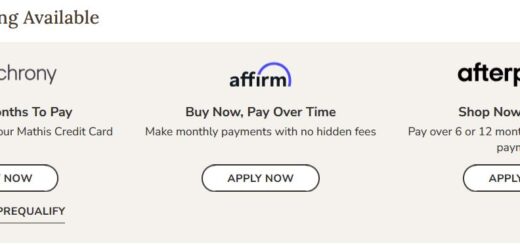No Interest for One Year
I realize that this title could very well be a reader’s reaction to this blog, but that is not what I discuss in this post. Rather, it is a sales gimmick that I have encountered twice this year when buying big ticket items. I fell for it the first time. The second time, I’m afraid I said out loud that I would usually charge for the lesson in economics explaining why that is not an appealing offer. That was a somewhat rude thing to say, and I did not really mean it. So, at no charge, here are the reasons.
The first time I got the “no interest for one year” offer this year was when we were deciding to have our whole house plumbing re-piped after a major leak. The cost was about $20,000. We had enough in savings to pay for this outright. Nevertheless I accepted the offer. The result was I was issued a new credit card with the plumbing job charged to it. That charge had special terms that allowed me to pay for it in 12 equal monthly payments with no interest charge. So far, so good. But I already have a lot of credit cards, and the best ones actually pay me a rebate. So instead of getting $100-$200 back after a year, I got zero. Had I charged anything else on this new credit card and not paid it off immediately, the annual interest rate charged would be 27%. And opening a new credit account could have adversely affected my credit score. The damage, but not the re-piping, was covered by our homeowner’s insurance, after months of delay.
Of course, if I had a plumbing emergency and could not afford to pay for it right away, these would be attractive terms. They would, however, be very expensive if I slipped up on the repayment.
Recently, Kathryn and I were shopping for new couches. In my opinion, no one should purchase couches that they can’t afford to pay for right away. If something goes wrong in your life in the next year, having this debt could make the problem much worse. If you are disciplined, it makes sense to pay using a rebate-giving credit card and then pay the credit card bill when it is due. Couches are available in a wide price range, so if you really need them, there will be some you can afford. Don’t go into debt for new, expensive couches, even if you get no interest charge for one year. Interest rates are still pretty low. Let’s say the couches cost $3000 after all the tax, delivery, and extended protection plan nonsense. I can put that in a FSLIC insured saving account for one year, and earn 4.35%, or $130.50. Or I can pay on a rebate card and get 1.5% back, or $45. On the other hand, if I pay with a high-interest credit card and make the minimum payment each month, I could end up paying more in interest than the original price of the furniture, and could still owe money after years of paying.
Why take $45 when I could get $130.50? For me, it not worth the stress of dealing with another credit card. They can cause my credit score to go down, they are a hassle to close, and they are another bill to pay. I am forgoing $85.50 over a year in order to sleep better, with less monkey business.









I was taught many years ago the difference between production loans and consumption loans. Production loans, when done appropriately, can be beneficial to you. Consumption loans hurt you financially and only benefit the loan companies.
Taking out loans just to buy consumer products you want is never a good idea. Here you buy something early on, perhaps on impulse, and then pay it off over time. You do this a few times and you end up spending a lot of your income, month in and month out, on interest payments. This means you have less money every month to buy things you want, or more seriously, things you need. Wanting a few things early in life doomed you to live on the cycle of debt payment. You can be one crisis away from a downward spiral if you let these payments get large. Instead just save up and pay without taking on any loan. This also has the good effect for you to spend some time thinking whether you really want that item – many times you will realize that it wasn’t that interesting to you and that it was just marketing hype, so you save the money for more important things (or just get a product that is a better value – instead of the latest smart phone, get a cheaper one from a prior year’s model, with less bells and whistles, that is almost as good, and only buy when your old phone needs replacing).
Production loans are when you borrow money to be more productive. The canonical example is when a business borrows to expand the business. This still should only be done when it makes sense – expanding in a saturated market is just stupid. But ordinary people can have production loans. Fixing your car when it is needed for work, taking out a loan for college to go into a high paying field (note: it seems many student loans nowadays are egregious), …
There is one one major exception to all this: a home loan. Almost nobody can afford to buy a house without a loan, and saving up for it would take decades (assuming you don’t fall behind in being able to pay for the ever increasing price of houses). Technically, owning a home might not be the best financial decision, based on the price of the house, the location it is, and the costs of decent apartments. However we seem to be getting to a point where even the upper middle class with 2 incomes can’t afford a home in a reasonable area with a decent commute. Homes soon will only be for the rich.
I understand and agree with you about loans in general. I don’t think home ownership is permanently out of reach of the younger generation. Real estate has always been cyclical, going between scarcity and glut roughly every 14 years. Many homes will be passed down to offspring who have not yet been able to afford their own. There is a widely perceived benefit to a society with deep ties to property, which is why home ownership has historically been a political priority and given tax advantages.